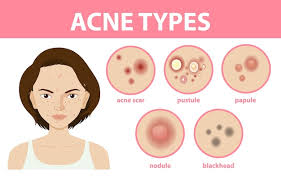Acne affects people of all ages, including adults, but can be effectively managed with the right treatment and care.
Acne is a widespread skin condition that plagues individuals of all ages, but it’s most commonly linked to adolescence. But acne doesn’t magically go away when you become an adult. Many adults, particularly women between the ages of 20 and 40, still have to contend with it. If you’ve had to battle breakouts or the residual effects of acne, don’t worry, you’re not alone. Fortunately, there are numerous methods for controlling and treating acne successfully.
What Is Acne?
Acne is a skin condition that covers a range of issues, including pimples, blackheads, whiteheads, and larger, more painful cysts or nodules. Acne most typically appears on the face, back, chest, and shoulders. This is how each type will look:

Symptoms of Acne
Acne may appear in various ways, and the most typical symptoms are:
Red bumps (papules or pustules)
Blackheads (darkened pores that are clogged)
Whiteheads (closed-up, clogged pores)
Nodules or Cysts (inflamed, deep bumps)
Post-inflammatory Hyperpigmentation: Spots that remain after healing of the acne, different from scarring.
In more extreme instances, acne can cause scarring that is permanent, appearing as indentations or raised spots. Acne can also play havoc with your self-esteem and mental health, causing some individuals to feel more self-conscious.
How Is Acne Diagnosed?
Diagnosing acne is fairly simple. It generally begins with a discussion of your medical history, including the family history, medications, and cleansers. Your physician will conduct a physical examination to assess the severity and the type of acne. In a few situations, blood tests may be required to analyze hormone levels, particularly if there’s a suspicion of an underlying condition.
Treatment Options for Acne
Treating acne generally involves a combination of lifestyle changes and medications. Here’s a rundown of what you can expect:
Lifestyle Modifications
- Gentle Cleansing: Clean your face twice daily with a gentle, non-abrasive cleanser. Over-washing or scrubbing too hard can dry out and irritate your skin, making acne worse.
Non-Comedogenic Products: Select skincare and makeup products that won’t clog pores. Look for products that are labeled “non-comedogenic.”
Healthy Habits: Don’t touch your face or pick at pimples, which can spread bacteria and cause more breakouts.
Medications
Benzoyl Peroxide: A common over-the-counter cream that kills bacteria that cause acne and prevents pores from becoming plugged.
Salicylic Acid: Common in acne medication, this is used to prevent plugged pores and is contained in numerous over-the-counter medications.
Antibiotics: Doctors will occasionally prescribe oral or topical antibiotics to minimize inflammation and combat bacteria.
Topical Retinoids: Tretinoin is an example of drugs used to unclog pores and is useful for treating acne and preventing scarring.
Oral Isotretinoin: For more extreme cases, isotretinoin (also well known by its brand name Accutane) is very effective at curing cystic acne and scarring prevention.
Conclusion

Acne can be a maddening and chronic problem, but keep in mind that you don’t have to battle it by yourself. With proper treatments, whether medical or lifestyle, you can control your acne. Whether you experience occasional blemishes or more serious outbreaks, there are solutions to assist you in having clearer skin and increased confidence.
If you’re battling acne and nothing seems to be working, speaking with a dermatologist is a good idea. They can tailor a treatment program to your individual needs and assist you in reaching the smooth, healthy skin that you deserve.